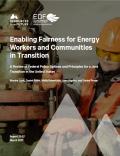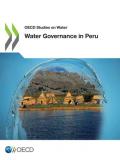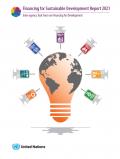The COP16 Accord has been central to the climate accords since 2009 and is an important symbol of trust. It states: "developed country Parties commit, in the context of meaningful mitigation actions and transparency on implementation, to a goal of mobilizing jointly USD 100 billion per year by 2020 to address the needs of developing countries". As the bedrock of international public finance, the $100 billion commitment can work in concert with all pools of finance, including the large and untapped pools of private finance.
This report describes an integrated and multi-sectoral blue economy strategy as the key to improving marine and coastal activities, equal opportunities, and livelihoods in Indonesia.

This paper compiles findings from a series of reports that unpack existing US and European policies related to just transition. To help policymakers identify the components of a comprehensive just transition policy package, more than 100 policies have been grouped into four primary categories.

This report provides an analysis of water governance in the country and policy recommendations to: strengthen the multi sectoral approach to water; improve the use of economic instruments to protect and sustainably use water resources, its sources and related ecosystem services; and strengthen regulatory conditions to improved access to safe drinking water and sanitation in urban and rural areas.

The 2021 Financing for Sustainable Development Report (FSDR) of the Inter-agency Task Force on Financing for Development warns that COVID-19 could lead to a lost decade for development. The report highlights the risk of a sharply diverging world in the near term where the gaps between rich and poor widen because some countries lack the necessary financial resources to combat the COVID-19 crisis and its socioeconomic impact. Short-term risks are compounded by growing systemic risks that threaten to further derail progress, such as climate change. The report recommends immediate actions to prevent this scenario and put forward solutions to mobilize investments in people and in infrastructure to rebuild better. It also lay outs reforms for the global financial and policy architecture to ensure that it is supportive of a sustainable and resilient recovery and aligned with the 2030 Agenda.
